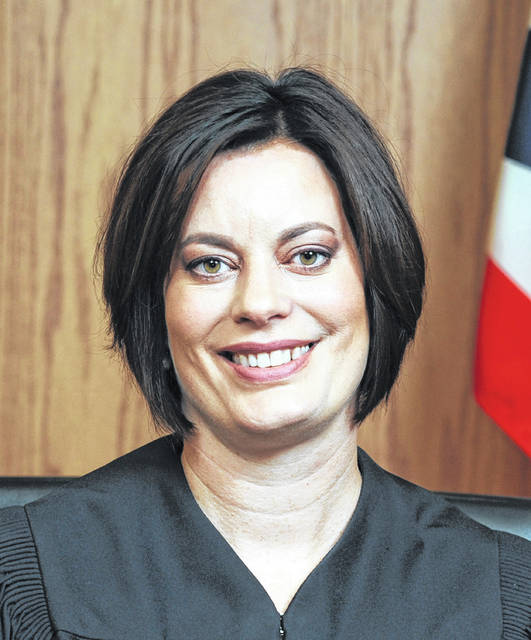
Okay, so maybe it’s not such a big deal for Uncle Sam. After all, he’s been parading Veterans Days up and down our nation’s Main streets for a century now. But it is a proud day, a very proud day and a first for Delaware’s Municipal Court, and especially our Veterans Treatment Court, named the “Delaware Mission Court.”
The very first Veterans Day (Armistice Day) was born Nov. 11 in 1919 to mark the end of World War I. Now, just about a hundred years later, Delaware will celebrate the holiday on Nov. 12, due to the weekend, as its own first Veterans Day with a formal Veterans Treatment Court.
And no, since you ask, you can cruise up and down Sandusky Street all day and never see a brick-and-mortar monolith designated “Delaware Veterans Courthouse.” The new court is a program, not a building, and it does business in Delaware’s Municipal Court, sharing the court’s space, staff and judicial proceedings.
What is different about the Mission Court is that it provides structured follow-up, an intervention system for certain veterans convicted of misdemeanors in municipal court. The follow-up recognizes the special needs of the veterans and also acknowledges our very real debt to those who served our country.
To dispel the myth right up front, the Mission Court is no warm-and-fuzzy Kumbaya for victimologists. The court only deals with offenders who plead guilty in Municipal Court to misdemeanor offenses. And the follow-up program involves a hard-headed acceptance of guilt, an embrace of failure, and a stern determination to let failure serve as a springboard to a better, more fulfilling life.
Not every veteran offender accepts or can adjust to such a structured regimen. In general, candidates for the Mission Court are referred by defense lawyers, judges, probation officers and others familiar with both the court and the special capabilities of the veteran offender under consideration.
Veterans courts are some of the newest kids on the judicial block. The first such court debuted in Buffalo, New York, in 2008. As the still-maturing system grows, it has developed along different pathways in different states and localities, some more formal than others, some more judicial. Generally, Veterans courts adopt a hybrid posture, part mental health court and part drug court. In any case, their programs utilize a problem-solving model rather than a traditional court model.
How does our Mission Court work? Well, there are many parts. First, there is the coordinator (a probation officer) who screens any veteran hoping to get on the Mission Court for alcohol or drug dependence and PTSD. Once placed on the Mission Court, the case is reviewed by a treatment team who devises a structured treatment plan for each veteran. In our Mission Court, the treatment team consists of local mental health and addiction specialists, law enforcement, prosecutors, defense attorneys, a victim advocate, a representative from the Delaware County Veteran Services Commission, and a Veterans Justice Outreach Specialist (VJO). The VJO is an employee of the VA who links each veteran with services available through the VA. Throughout the year a veteran is on the Mission Court, he is supervised by a probation officer (a veteran, himself) who randomly tests the veteran for drugs/alcohol, conducts home visits, and ensures the veteran is attending counseling in accordance with the treatment plan. The treatment team meets twice a month right before the court sessions.
The keystone to any successful Veterans Court, however, is the veteran mentor.
Each participant in the Mission Court is paired with a veteran mentor, who volunteers with the court to help the veteran offender navigate the system. One mentor, Jon Bennehoof, a Vietnam vet and the mayor of Powell, described his role as being a mixture of coach, brother and advocate. He described his bond with his mentee to be unique, healing and strengthening for both himself and the mentee. “It really is a win-win relationship,” says Bennehoof.
Veterans courts are spreading, and for good reason: They work! Because Veterans courts are relatively new, long range evaluations of the effectiveness are yet to be measured. But all the preliminary assessments are strongly positive.
One study in Ohio showed a recidivism rate among Veterans Court participants of only 10 percent, far better that the re-offender rate in general. And, perhaps more important, while all participants in the program initially met the diagnostic criteria for chemical dependence and PTSD, on leaving the program, only 25 percent of the participants did. Other, smaller studies in Ohio showed even better success rates.
So, while Uncle Sam has, over a century now, celebrated Veterans Day with parades, speeches and a well-deserved pat on the back for vets, here in Delaware our nascent Mission Court is just getting off the ground. We have to be a bit more modest. Maybe we’ll put a candle on a cupcake.


